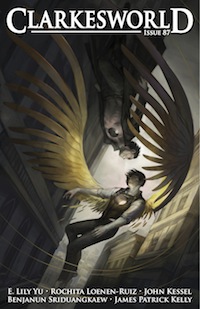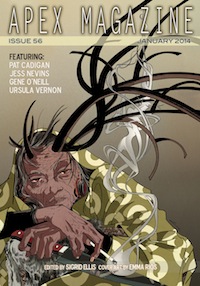Welcome back to the Short Fiction Spotlight, a space for conversation about recent and not-so-recent short stories. Last time around I discussed the novella Cry Murder! In a Small Voice by Greer Gilman, published by Small Beer Press. For this week, there are a couple of recent short stories I wanted to talk about: “Silent Bridge, Pale Cascade” by Benjanun Sriduangkaew in Clarkesworld (Dec. ’13) and “Jackalope Wives” by Ursula Vernon in Apex (Jan. ’14).
Benjanun Sriduangkaew is a Thai writer whose name has been coming to my attention more and more, recently—in fact, I discussed one of her stories from Clockwork Phoenix 4 in a previous SFS post. She often writes complexly gendered characters in equally complex science-fictional settings, and “Silent Bridge, Pale Cascade” is another of these sorts of stories. Ursula Vernon, on the other hand, is a familiar name to many already: she’s the person behind the comic Digger, which won a Hugo in 2012 for Best Graphic Story. “Jackalope Wives” is a prose piece—traditional short fiction, if you will—and it also deals with gender and the cost of wants, though in a different way.
“Jackalope Wives” is—though wearing the garb of the American southwest—a sort of selkie story, familiar in tone and tropes to most readers who’ve been lingering around the speculative fiction field for the past several years. There have been, after all, a lot of selkie stories recently. In no small part that’s because the mythos is remarkably charged, particularly for feminist writers: it’s all about the loss of freedom, the forceful taking of a person’s identity, and often the brutality required to regain it from the hands of one’s tormentor.
Vernon’s southwestern interpretation is, at first, not enough to render it significantly different from the handfuls of other stories of this sort I’ve read. But it’s not entirely predictable, and that’s its saving grace: the characters go off-script sometimes. The grandmother was once herself a jackalope wife (surprise). However, instead of taking her skin and returning to the desert after getting rid of her captor, she stays human; she burns her own rabbit skin, marries a man she loves, and raises children. That isn’t the direction I’m used to seeing a selkie-type story take.
This is, it seems to me, more a story about choices and consequences than autonomy specifically. The grandson makes several poor choices, beginning with his urge to steal a jackalope wife for himself, and there are certainly consequences to that. The grandmother goes out to the desert to potentially trade her life to heal the young jackalope woman—another choice. She also chose, ultimately, to live as a human woman and to adopt a role that she was once forced into. These are all complicated personal choices, and they all have costs for the people involved. Vernon does a good job making that cause/effect relationship clear.
Though, overall, I wouldn’t say this is a great story. There are occasional missteps in the prose (as well as one continuity error), and it is, ultimately, treading familiar ground. However, it is handsome and does have its moments of freshness. As this is also the first issue under a new masthead—Apex is now edited by Sigrid Ellis—I’m interested to see if “Jackalope Wives” is an indication of the sort of direction we’ll see future issues take.
 Then there’s “Silent Bridge, Pale Casade,” a story whose protagonist has been embodied as both a man and as a woman at different times, a story that also involves a neutrois character. Though of course it drew my attention, gender is delightfully unremarkable in the world Sriduangkaew has constructed. The shifting gender of the protagonist is counted as a normal factor of daily life. For example, when visiting with her ex-wife, she observes that the other woman never quite liked it when she was a man.
Then there’s “Silent Bridge, Pale Casade,” a story whose protagonist has been embodied as both a man and as a woman at different times, a story that also involves a neutrois character. Though of course it drew my attention, gender is delightfully unremarkable in the world Sriduangkaew has constructed. The shifting gender of the protagonist is counted as a normal factor of daily life. For example, when visiting with her ex-wife, she observes that the other woman never quite liked it when she was a man.
That’s it: just a brief observation about the kind of difficulty that shifting embodiments/genders might cause in an intimate relationship. Otherwise, the gender of characters is background detail. The characters don’t seem terribly concerned with it, particularly when faced with the consequences of their system of synching and controlling the memories of citizens. I very much enjoy stories that are constructed in this way: gender-variant and diverse, but casually so.
I also can’t deny that I love seeing the third-person plural pronoun used for an individual in fiction, on the page—recognizable, concrete, etc.
More generally, though this piece at first appears to be a diplomatic intrigue story, the reader becomes aware by the end that it’s not, really. After all, the intrigue itself is in no way settled in the piece; it’s merely presented and explored a bit. The ending is open, and on reflection, it seems that much of the story is as well, concerned more with illustrating its point than making a particular argument on it. The politics and ethics of a peace built on, well, mind-control are something worth looking at—but the questions presented aren’t necessarily easy to give a direct answer to.
The prose lends itself to this sort of logic as well. It’s poetic in tone, rich with implication and description rather than exposition. The shape of the piece is like a bouquet, in a sense: starting from the narrow point of the protagonist waking back up to life, ending with a burst of possibilities, the blooms. The ending leaves us on the precipice, having hinted at several potential outcomes, and it gives us no comfortable ethical ground to stand on as we empathize with the protagonist and her ex-wife alike.
The non-traditional approach to “plot”/narrative arc is not an entirely successful strategy, though. I’m left with perhaps too many questions that should be clearer, such as, ‘why choose to bring this person back to life at all, really?’ The frequent complexity of Sriduangkaew’s worlds—as I noted in the Clockwork Phoenix story as well—and the relatively narrow space afforded to a short story sometimes collide with no one the winner. There are parts of this otherwise dense, delightful story that remain unrealized.
So, in the end, there’s a balance struck between the handsome open ending, the works it’s doing in the readers’ mind, and the perhaps-too-open nature of the piece as a whole. “Silent Bridge, Pale Cascade” is well-equipped in the ambition department—but, seriously, give me an ambitious gender-conscious queer story any day over a piece that’s perfectly constituted in all of its facets but is also terribly dull. Personally, I look forward to reading more of Sriduangkaew’s work—after this story and the previous one I discussed here, I think that she has quite a lot of provocative, quality work in her future.
Lee Mandelo is a writer, critic, and editor whose primary fields of interest are speculative fiction and queer literature, especially when the two coincide. She can be found on Twitter or her website.










